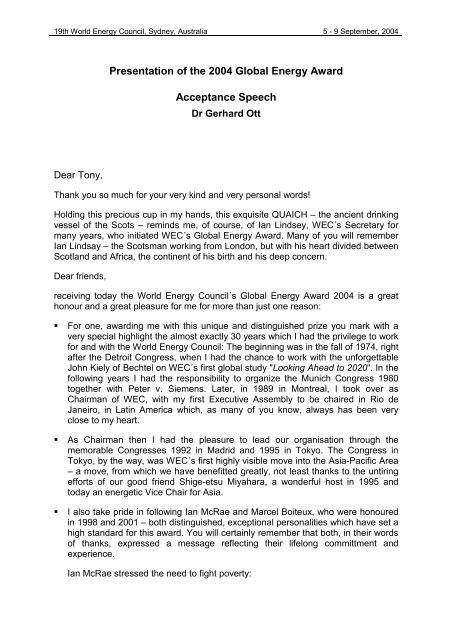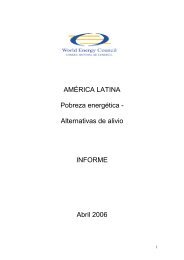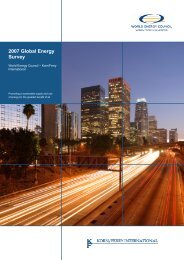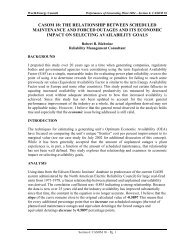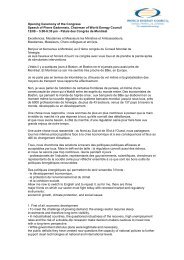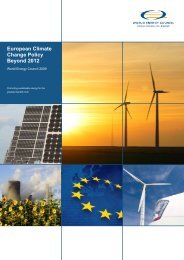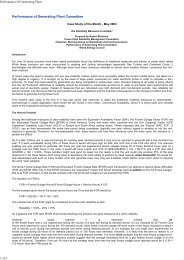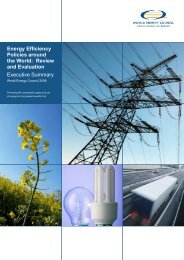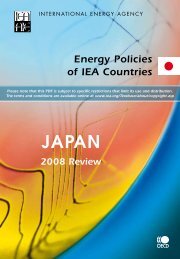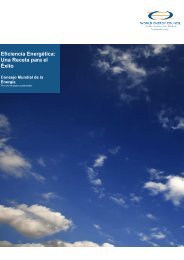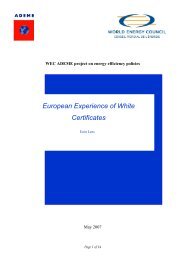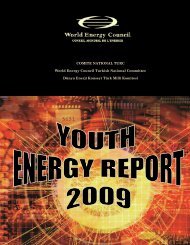Dr Gerhard Ott - World Energy Council
Dr Gerhard Ott - World Energy Council
Dr Gerhard Ott - World Energy Council
Create successful ePaper yourself
Turn your PDF publications into a flip-book with our unique Google optimized e-Paper software.
19th <strong>World</strong> <strong>Energy</strong> <strong>Council</strong>, Sydney, Australia 5 - 9 September, 2004<br />
Presentation of the 2004 Global <strong>Energy</strong> Award<br />
Acceptance Speech<br />
<strong>Dr</strong> <strong>Gerhard</strong> <strong>Ott</strong><br />
Dear Tony,<br />
Thank you so much for your very kind and very personal words!<br />
Holding this precious cup in my hands, this exquisite QUAICH – the ancient drinking<br />
vessel of the Scots – reminds me, of course, of Ian Lindsey, WEC´s Secretary for<br />
many years, who initiated WEC´s Global <strong>Energy</strong> Award. Many of you will remember<br />
Ian Lindsay – the Scotsman working from London, but with his heart divided between<br />
Scotland and Africa, the continent of his birth and his deep concern.<br />
Dear friends,<br />
receiving today the <strong>World</strong> <strong>Energy</strong> <strong>Council</strong>´s Global <strong>Energy</strong> Award 2004 is a great<br />
honour and a great pleasure for me for more than just one reason:<br />
<br />
<br />
<br />
For one, awarding me with this unique and distinguished prize you mark with a<br />
very special highlight the almost exactly 30 years which I had the privilege to work<br />
for and with the <strong>World</strong> <strong>Energy</strong> <strong>Council</strong>: The beginning was in the fall of 1974, right<br />
after the Detroit Congress, when I had the chance to work with the unforgettable<br />
John Kiely of Bechtel on WEC´s first global study "Looking Ahead to 2020“. In the<br />
following years I had the responsibility to organize the Munich Congress 1980<br />
together with Peter v. Siemens. Later, in 1989 in Montreal, I took over as<br />
Chairman of WEC, with my first Executive Assembly to be chaired in Rio de<br />
Janeiro, in Latin America which, as many of you know, always has been very<br />
close to my heart.<br />
As Chairman then I had the pleasure to lead our organisation through the<br />
memorable Congresses 1992 in Madrid and 1995 in Tokyo. The Congress in<br />
Tokyo, by the way, was WEC´s first highly visible move into the Asia-Pacific Area<br />
– a move, from which we have benefitted greatly, not least thanks to the untiring<br />
efforts of our good friend Shige-etsu Miyahara, a wonderful host in 1995 and<br />
today an energetic Vice Chair for Asia.<br />
I also take pride in following Ian McRae and Marcel Boiteux, who were honoured<br />
in 1998 and 2001 – both distinguished, exceptional personalities which have set a<br />
high standard for this award. You will certainly remember that both, in their words<br />
of thanks, expressed a message reflecting their lifelong committment and<br />
experience.<br />
Ian McRae stressed the need to fight poverty:
- 2 -<br />
"The best way to combat poverty is to provide economic growth and social<br />
upliftment and the key to this is the availability of usable, efficient and<br />
affordable energy.“<br />
And Marcel Boiteux, in his brilliant way of formulating the essential, made a case<br />
for nuclear energy as an integral part of the overall energy mix:<br />
"On peut le dire, il faut le dire, le Monde ne pourra se passer de l´énergie<br />
nucléaire.“<br />
You will agree that both messages are as compelling and valid today as they<br />
were in 1998 and in 2001.<br />
Also the message I would like to leave with you today, my friends, reflects the<br />
experience I have made over the years, witnessing all the varying stages of energy<br />
politics – from planification to liberalisation – and of energy economics – from an<br />
unsustainable low to an unsustainable high oil price. And because also in the future<br />
developments hardly ever will be even and steady, but will rather come in waves,<br />
sometimes choppy and contradictory, it is the more important, I think, that we at WEC<br />
concentrate on – and stay loyal to – a very few fundamentals:<br />
<br />
<br />
For one, we should focus our work on issues and strategies of a global and longterm<br />
nature – as against often too narrow and too short-term politics.<br />
Also, and WEC with its over 90 Member Committees from all parts and cultures of<br />
this world is the ideal instrument for this, we should committ ourselves to creating<br />
a better understanding of the needs of developing countries in order to build<br />
bridges instead of deepening the gaps and rifts between the so-called First and<br />
Third <strong>World</strong>s.<br />
The <strong>World</strong> <strong>Energy</strong> <strong>Council</strong>, Ladies and Gentlemen, in fact has already made<br />
considerable progress in this respect. As examples of giving recognition to the socalled<br />
Third <strong>World</strong>, we can refer to the many Congresses and Executive Assembly<br />
Meetings we have had over the recent years in these parts of the globe: In Latin<br />
America in 2001 (Buenos Aires), in Africa in 2002 (Egypt) and 1994 (South Africa), in<br />
Asia in 2000 (India) and 1997 (Thailand). Still more important, however, is the fact<br />
that WEC has decided here in Sydney to strengthen its regional work. And let me<br />
add a personal remark: I think we have been very fortunate, indeed , to have had for<br />
the last three years Antonio del Rosario as our Chairman – representing all of WEC,<br />
of course, but with a particular focus on developing countries. Thank you, Tony, for<br />
your initiatives and for your wise and thoughtful leadership!<br />
Now, mentioning the remarkable progress already made does not mean, of course,<br />
that our new Chairman, André Caillé and his team would have to fear that they might<br />
run out of work. Actually, with the initiatives he has presented here in Sydney he is<br />
taking on his shoulders a rather heavy bundle of tasks. Let me wish you every<br />
success – in particular for the project of continuing and expanding the Patrons<br />
Program, which deserves every support!
- 3 -<br />
I should like to add, my friends, a few thoughts on WEC and the role it could and<br />
should play in the future. To define this role realistically, two aspects, in my view, are<br />
important:<br />
<br />
First, we have to acknowledge that WEC today has to act in a difficult<br />
environment and under circumstances which often are averse to what makes the<br />
value of WEC, because we are living in an inverted, or even perverted world: Let<br />
me take as an example a major energy company which has just announced a<br />
solid profit, distinctly higher than in the preceding year – every reasonable<br />
observer would expect the price of its shares to increase. Not in our rather<br />
paradox world of today: The share-price went down because the announced<br />
profit, although higher than ever, was lower than expected by the omniscient<br />
analysts (whose "objectiveness“ very often is hardly more than the fact that they<br />
are not prejudiced in any way by any real business-experience of their own).<br />
With such analysts pressing the management of companies every quarter for<br />
further cost-reductions and ever higher profits, the management of such<br />
companies will have serious doubts whether it should continue its financial<br />
contributions to an organisation like WEC or its national Member Committee –<br />
institutions the value of which lies mainly in global and long-time work which,<br />
naturally, is hardly measurable in Dollars, Pounds or Euros, and which certainly<br />
cannot directly contribute to the quarterly profits urged for by analysts.<br />
The only possible answer for WEC in this situation is, I think, to maintain, to<br />
confirm – but also to "market“ more efficiently! – its character and value as a longterm<br />
oriented, strategic, global "think-tank“ – an institutuion which is approaching<br />
problems with balance, not bias, is analysing problems based on fact, not fantasy,<br />
is answering problems with solutions unconventional, not uniform, and is acting<br />
on all problems in a spirit of challenge, not complacency. Above all, we must<br />
withstand the temptation to compete with the prevailing short-termism of today´s<br />
energy markets, because this would make WEC in the end lose its unique<br />
identity.<br />
<br />
Secondly, and notwithstanding the difficult process WEC has to live through now<br />
and in the years to come, I am convinced that the true value of WEC will be more<br />
and more recognized due to a phenomenon, an apparent paradox in world<br />
political trends: On the one hand there is a tendency to create ever larger units,<br />
as in the case of the economic communities – Nafta, European Union, APEC etc.<br />
Also, the resolution of global problems demands global action – WTO, UNCED,<br />
Kyoto Protocol etc. On the other hand, and at the same time, there is a<br />
widespread public dislike of what is seen as excessive centralisation. The<br />
dominance of large, faceless bureaucracies which appear to disregard the needs<br />
of individuals and local communities is more and more resented.<br />
These two seemingly opposed trends are, in reality, compatible – compatible<br />
through organisations like the <strong>World</strong> <strong>Energy</strong> <strong>Council</strong> – non-commercial and nongovernmental,<br />
committed to people, not to ideologies. There I see an important –<br />
and growing – role for WEC: As a catalyst between global necessities and<br />
individual needs, working not through command and control, but through<br />
cooperation and conviction. With its joint work together with UNDP and UNDESA,<br />
culminating in the <strong>World</strong> <strong>Energy</strong> Assessment of 2002 and its recent update 2004,
- 4 -<br />
WEC has made a first important step in this direction. We all know, this was an<br />
undertaking not without risks – that it became a success, we owe to the devoted<br />
work and the persistance of people like John Baker, Emad El-Sharkawi and<br />
Gerald Doucet. I am very glad to see that it is the firm will of our organisation to<br />
continue, to consolidate and to expand this committment.<br />
To conclude, my friends: I believe in WEC´s mission, I consider myself fortunate<br />
having been able to contribute to its work, I am proud of the award received<br />
today. Above all, I thank you for all the support I had from you over so many years<br />
– and let me include in this thank explicitly my wife Marianne, the best<br />
"ambassadress“ I could think of all those years.<br />
My best wishes to you all!


